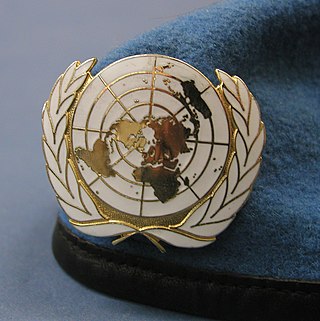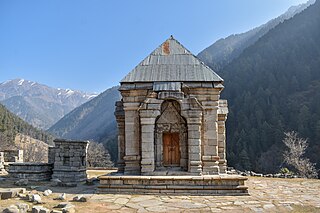
The member states of the United Nations comprise 193 sovereign states. The United Nations (UN) is the world's largest intergovernmental organization. All members have equal representation in the UN General Assembly.
The Karachi Agreement of 1949 was signed by the military representatives of India and Pakistan, supervised by the United Nations Commission for India and Pakistan, establishing a cease-fire line in Kashmir following the Indo-Pakistani War of 1947. It established a cease-fire line which has been monitored by United Nations observers from the United Nations since then.

The United Nations Mission in Ethiopia and Eritrea (UNMEE) was established by the United Nations Security Council in July 2000 to monitor a ceasefire in the border war that began in 1998 between Ethiopia and Eritrea. First military troops Netherlands - Canadian battalion 'NECBAT' arrived and established bases in the region in December 2000.

The United Nations Mission in Liberia (UNMIL) was a United Nations peacekeeping operation established in September 2003 to monitor a ceasefire agreement in Liberia following the resignation of President Charles Taylor and the conclusion of the Second Liberian Civil War (1999–2003). At its peak it consisted of up to 15,000 UN military personnel and 1,115 police officers, along with civilian political advisors and aid workers.

The United Nations has played an advisory role in maintaining peace and order in the Kashmir region soon after the independence and partition of British India into the dominions of Pakistan and India in 1947, when a dispute erupted between the two new States on the question of accession over the princely state of Jammu and Kashmir. India took this matter to the UN Security Council, which passed resolution 39 (1948) and established the United Nations Commission for India and Pakistan (UNCIP) to investigate the issues and mediate between the two new countries. Following the cease-fire of hostilities, it also established the United Nations Military Observer Group in India and Pakistan (UNMOGIP) to monitor the cease-fire line.

The United Nations Integrated Mission in East Timor (UNMIT) was established on 25 August 2006 by UN Security Council Resolution 1704. Its objectives are "to support the Government in consolidating stability, enhancing a culture of democratic governance, and facilitating political dialogue among Timorese stakeholders, in their efforts to bring about a process of national reconciliation and to foster social cohesion". In its most recent resolution on UNMIT, the Council extended its mandate until 26 February 2012. UNMIT and ISF troops left the country at the end of 2012.

United Nations Security Council Resolution 47, adopted on 21 April 1948, concerns the resolution of the Kashmir conflict. After hearing arguments from both India and Pakistan, the Council increased the size of the UN Commission created by the former Resolution 39 to five members, instructed the Commission to go to the subcontinent and help the governments of India and Pakistan restore peace and order to the region and prepare for a plebiscite to decide the fate of Kashmir.

United Nations Security Council Resolution 80, adopted on March 14, 1950, having received the reports of the Commission for India and Pakistan, as well as a report from General A. G. L. McNaughton, the Council commended India and Pakistan for their compliance with the ceasefire and for the demilitarization of Jammu and Kashmir and agreement on Fleet Admiral Chester W. Nimitz as the future Plebiscite Administrator.

United Nations Security Council Resolution 98, adopted on December 23, 1952, urged the Governments of India and Pakistan to enter into immediate negotiations under the auspices of the United Nations Representative for India and Pakistan in order to reach an agreement on the specific number of troops to remain of each side of the cease-fire line at the end of the previously established period of demilitarization. As proposed by the UN Representative this number was to be between 6000 Azad forces and 3500 Gilgit and northern scouts on the Pakistani side and 18000 Indian forces and 6000 local state forces on the Indian side. The resolution then thanked the UN Representative for his efforts, requested the Governments of India and Pakistan report to the Council no later than 30 days after the adoption of this resolution and asked the UN Representative to keep the Council informed of any progress.

United Nations Security Council Resolution 126 was adopted on 2 December 1957. It was the last of three resolutions passed during 1957 to deal with the dispute between the governments of India and Pakistan over the territories of Jammu and Kashmir. It followed a report on the situation by Gunnar Jarring, representative for Sweden which the council had requested in resolution 123. It requests that the governments of India and Pakistan refrain from aggravating the situation, and instructs the United Nations Representative for India and Pakistan to visit the subcontinent and report to the council with recommended action toward further progress.

United Nations Security Council Resolution 191, adopted on June 18, 1964, after reiterating its previous requests of the Republic of South Africa and again condemning apartheid, the Council decided to establish a Group of Experts made up of representatives of all the then current members of the Council to study the feasibility and effectiveness of measures which could be taken by the Council under the Charter. The Council also invited the Secretary-General to establish education and training programs for South Africans abroad.

United Nations Security Council Resolution 203, adopted on May 14, 1965, in the face of growing instability, a developing civil war and the probability of foreign intervention in the Dominican Republic, the Council called for a strict cease-fire and invited the Secretary-General to send a representative to the Dominican Republic to report to the council on the present situation.

United Nations Security Council Resolution 209, adopted on September 4, 1965, with a deteriorating situation along the cease-fire line in Kashmir, the Council called upon both India and Pakistan to take all steps necessary to immediately cease fighting and return to their respective sides of the line. The Council also called on the two governments to co-operate fully with the United Nations Military Observer Group in Pakistan and asked the Secretary-General to report back on the implementation of the resolution within three days.

United Nations Security Council Resolution 210, adopted unanimously on September 6, 1965, after receiving a report by the Secretary-General on the developments in the situation in Kashmir, the Council called on the parties to cease hostilities in the entire area of conflict immediately and withdraw all armed personnel to the positions they held before August 5, 1965. The Council requested the Secretary General do all he possibly could to give effect to the present resolution and resolution 209 as well as strengthening the United Nations Military Observer Group in Pakistan. The Council then decided to keep the issue under urgent and continuous review.

United Nations Security Council Resolution 211 was adopted on September 20, 1965. After the calls for a cease-fire in resolutions 209 and 210 went unheeded, the Council demanded that a cease-fire take effect at 0700 hours GMT on September 22 and that both forces withdraw to the positions held before August 5. The Council requested the Secretary-General ensure the supervision of the cease-fire and called on all states to refrain from any action which might aggravate the situation. The Council also decided that as soon as a cease-fire could be reached it would consider what steps could be taken to assist towards a settlement of the political problem underlying the conflict.

United Nations Security Council Resolution 259, adopted on September 27, 1968, concerned with the welfare of the inhabitants of the Arab territories then occupied by Israel after the Six-Day War, the Council requested the Secretary-General send a Special Representative to report on the implementation of resolution 237. The Council requested that Israel receive and co-operate with the Special Representative and that the Secretary-General should be afforded all co-operation in order to implement the present resolution.

United Nations Security Council Resolution 307, adopted on December 21, 1971, after hearing statements from India and Pakistan, the Council demanded that a durable cease-fire be observed until withdrawals could take place to respect the cease-fire line in Jammu and Kashmir. The council also called for international assistance in the relief of suffering and rehabilitation of refugees as well as their return home and a request for the Secretary-General to keep the council informed on developments.

The first emergency special session of the United Nations General Assembly was convened on 1 November and ended on 10 November 1956 resolving the Suez Crisis by creating the United Nations Emergency Force (UNEF) to provide an international presence between the belligerents in the canal zone. The First Emergency Special Session was convened due to the failure of the Security Council to resolve the instability at the Suez Canal. This forced an invocation of the "Uniting for Peace" resolution, which transferred the issue from the Security Council to the General Assembly in its Emergency Special Session (ESS) guise. On the fourth day of the ESS the Canadian representative, Lester B. Pearson, introduced the concept of a UN police force. The creation of the United Nations Emergency Force was approved by the General Assembly with 57 supports and zero opposes. The vote had 19 countries abstaining, including the United Kingdom, France, Egypt, the Soviet Union and several Eastern European countries.

The sixth emergency special session of the United Nations General Assembly was held between 10 and 14 January 1980 to consider the situation in Afghanistan. As the what is known as the Soviet–Afghan War began, members of the United Nations General Assembly requested the Security Council consider the situation. The USSR veto of a resolution led the other members to invoke the 'Uniting for Peace' resolution to defer the issue to the General Assembly in an emergency special session. It was the sixth emergency special session since the 'Uniting for Peace' resolution was adopted in 1950. The session was dominated by questions of its legitimacy since the lately-hatched and newly-recognized Democratic Republic of Afghanistan had invited the Soviet intervention in their civil war. Led by the non-aligned members, the session ended with a resolution from the General Assembly calling for the immediate, unconditional and total withdrawal of foreign troops from Afghanistan and the cessation of all outside intervention, subversion, coercion or constraint, of any kind whatsoever, so that its people could freely choose its own economic, political and social systems. The Soviet machine scored a victory when, in the words of political scientist William Maley, "the General Assembly accepted the credentials of the delegation of the Soviet-installed puppet regime in Kabul which duly voted against the resolution," thus cementing the notion that it had invited them as peacekeepers.

United Nations Security Council resolution 1277, adopted on 30 November 1999, after recalling all relevant resolutions on Haiti including Resolution 1212 (1998), the Council extended the mandate of the United Nations Civilian Police Mission in Haiti (MIPONUH) pending the transition to a civilian group by 15 March 2000.














